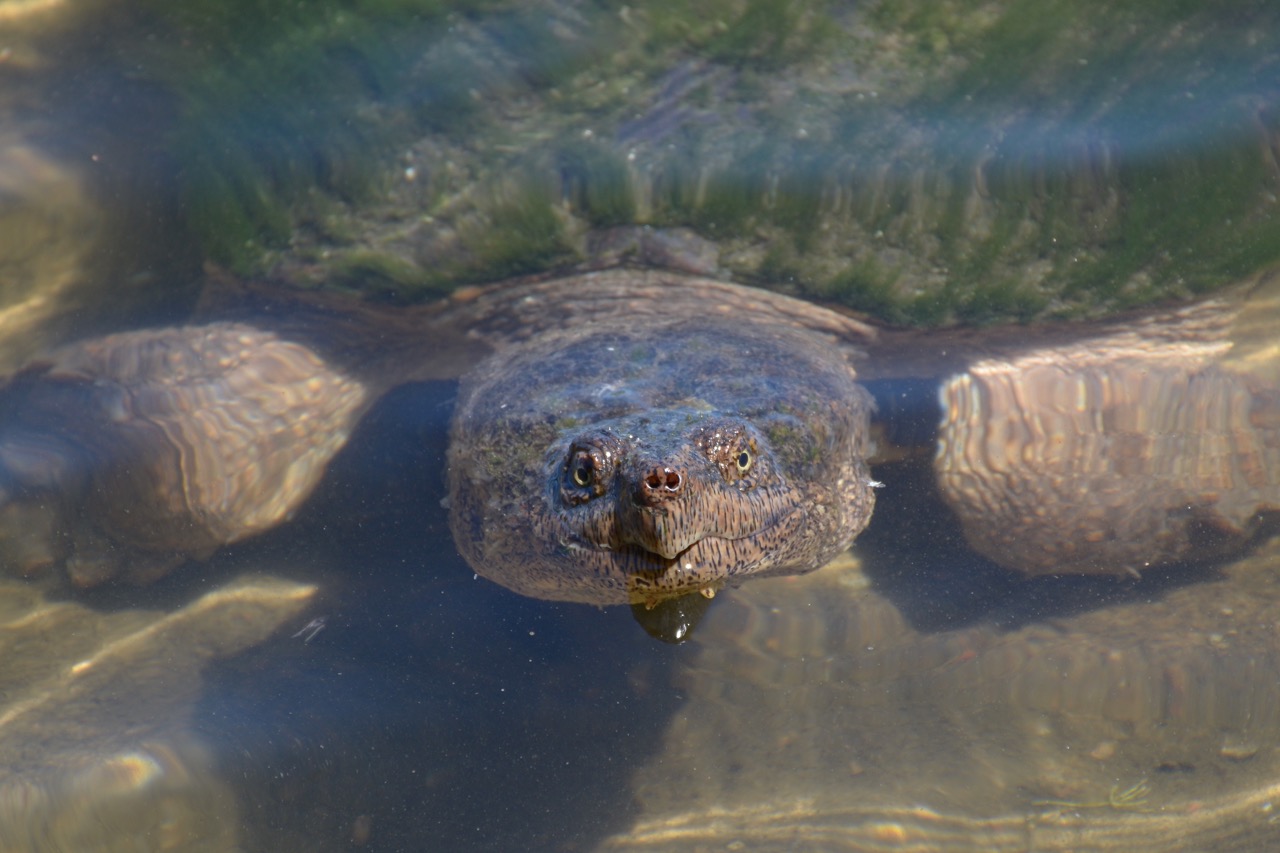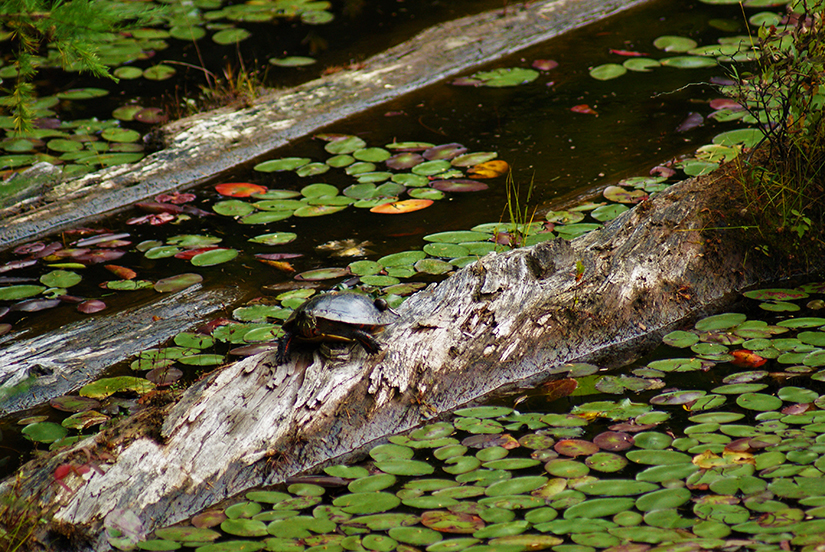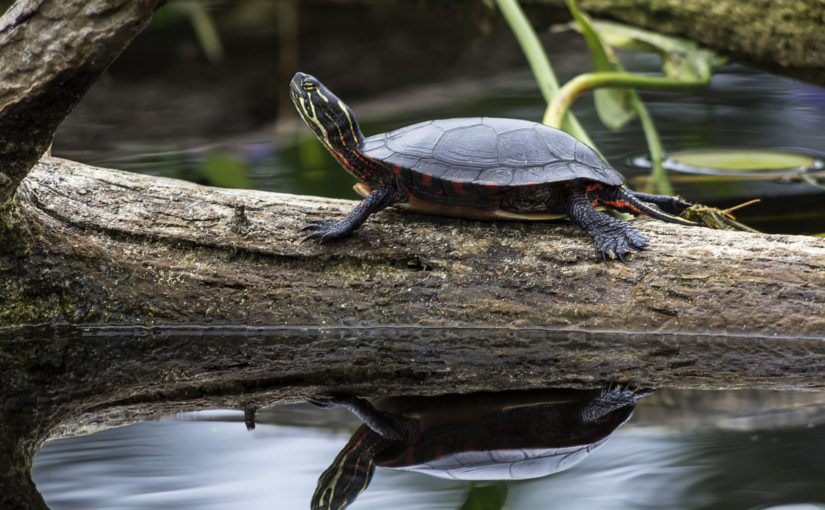Today’s post comes from Amy Tanner, Biology/Ecology Intern with Ontario Parks’ Southwest Zone.
Before heading out for a fun day of fishing, we all go through our checklists. Have we got:
- our licence?
- our safety equipment, from PFD to sunscreen?
- our fishing gear?
But here are two questions many people don’t ask:
- what other living things could I accidentally catch while fishing?
- do I know how to handle an unexpected catch?
Hooked on your line
Turtles are one of the animals that get caught accidentally when fishing.

Ontario has eight species of turtles. Each one is considered a species-at-risk in Canada, meaning they’re declining in number and are at risk of disappearing from the wild.
These reptiles sometimes swallow fishing hooks and lures thinking that they would be a tasty snack. They can also get foul-hooked just swimming along through an area where people are fishing.

When turtles swallow hooks it is often fatal, especially when anglers cut their line and the hooks remain inside the turtle. Even when they are taken to a medical facility, x-rays and internal surgeries are often required to remove the hooks. The surgeries tend to be quite lengthy and are often very risky for the turtles.
After the hooks have been removed, they will frequently require rehabilitation time. Surgery, medication and rehabilitation costs for one turtle alone could be more than $1,000.

Preserving the populations of our at-risk turtle species is extremely important
These species have very long lifespans and take many years to reach sexual maturity (for females, it can sometimes take well over 10 years). Turtles face numerous threats daily including habitat loss, collisions with vehicles, natural predation, illegal poaching, recreational fishing, and many more.

Unfortunately due to all these pressures, less than 2% of eggs and hatchlings reach maturity, meaning it can take decades to naturally replace even one mature turtle that is killed. On average, for every 1,400 eggs produced by a female snapping turtle, only one becomes a mature adult.
Overall, this means that the turtle would need to live approximately 58-60 years to replace herself in the population with another mature snapping turtle! Because of this, it is extremely important to save as many turtles as possible, especially adults.
How to keep turtles off the hook?
One of the best ways to prevent this type of unexpected catch is to stop fishing in an area if you see a turtle in the water. Wait for the turtle to swim away before continuing to fish.

Remember to stay in designated or appropriate fishing areas to avoid disturbing sensitive shoreline habitats, such as turtle nesting and basking areas.
You can also choose to fish with barbless hooks. Barbless hooks can be purchased, or you can make your own by removing the barbs with pliers. Should you accidentally hook a turtle, the lack of barbs will make extracting the hook or lure significantly easier for a trained professional.
Remember: never leave tackle behind. Remove as much of your tackle as possible in a safe manner if your line gets snagged. If you see tackle left behind by others, do your best to remove that, too.
Another important practice is to avoid using fishing tackle that contains lead. If it gets left behind, this lead enters the food chain in various ways and can persist in the environment with negative effects for hundreds of years. The ingestion of only one lead sinker can result in fatal lead poisoning in turtles and other wildlife species if accidentally consumed.
What if I hook a turtle?
Turtles can camouflage themselves extremely well and sometimes you are unaware that a turtle is even in the area until you accidentally hook it.
If you do hook a turtle, remain calm.
First of all, do not cut the line. The best thing to do is to try and capture the turtle, so that it can be given the appropriate medical treatment.

Minimize reeling as much as possible as this will reduce the amount of pressure being placed on the hook. Use your net to catch the turtle and bring it safely to shore.
Try to touch the turtle as little as possible. Turtles are also able to stretch their necks to surprising lengths which can easily startle unsuspecting people, so keep your hands and body out of their reach. They also have quite sharp claws, which they will use to try and escape from a would-be rescuers grasp.
 Alerting an Ontario Parks staff member to the situation is essential.
Alerting an Ontario Parks staff member to the situation is essential.
We can assist with safely handling the turtle, finding an appropriate container to transport it, keeping it in a dark, quiet place to reduce stress, and contacting trained professionals who have the authorizations to handle, transport, and care for injured turtles.
If a turtle has swallowed a hook, they will almost certainly need medical attention. If you are not fishing in a provincial park or Ontario Parks staff aren’t present, call the Ontario Turtle Conservation Centre at 705-741-5000 for further guidance.
The Centre is located in Peterborough, but they have partnerships with many Turtle First Response Centres across Ontario and will be able to direct you to an appropriate location to arrange transportation.
Want to learn more about keeping turtles safe?
Visit the Ontario Turtle Conservation Centre website to find out more information about what to do if you have an injured turtle. Additionally, the Government of Ontario keeps a list of authorized wildlife rehabilitators who can provide temporary care to sick, injured or abandoned animals.

If you are new to fishing in general, be sure to check out our Learn to Fish Program, offered at various parks throughout Ontario.
Remember:
- Fish with barbless hooks
- Stop fishing if you see a turtle swimming in the area you are fishing
- If you catch a turtle, remain calm
- Don’t cut the line
- Try to reel as little as possible and catch the turtle with a net
- Inform an Ontario Parks staff member ASAP to assist you, or contact the Ontario Turtle Conservation Centre at 705-741-5000
